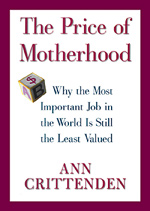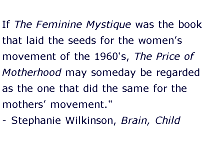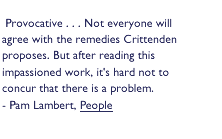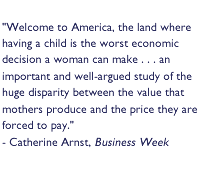 |
 Information
about Ann Crittenden's book: "The Price
of Motherhood" - now in paperback.
Information
about Ann Crittenden's book: "The Price
of Motherhood" - now in paperback.
|
 |
The Price of Motherhood, a widely acclaimed
bestseller, was listed by the Chicago
Tribune as one of the Top Ten feminist
literary works since publication
of Betty Friedan's The Feminine Mystique
in 1964. The book argues that although
women have been liberated, mothers
have not. Drawing on hundreds of
interviews, and the latest research
in economics, family law, sociology,
history, and child development, this
provocative book shows how mothers
are uniquely disadvantaged economically.
Unlike most other nations, the United
States systematically refuses to
value or support unpaid caring labor.
As a result, mothers, children, and
society as a whole pay an enormous
price. Crittenden makes a forceful
argument that the anachronistic,
dependent status of mothers and other
caregivers is the unfinished business
of the woman's movement.
We now know that roughly two-thirds
of GDP is created by "human capital"
- by curious, capable, skilled human
beings. We also know that human potential
is stimulated or stunted during the
earliest years. This implies that mothers
and other primary caregivers of children
are society's greatest wealth producers;
they literally do have "the most
important job in the world."
Evidence from all over the globe also
shows that resources in the hands of
mothers are more likely to be invested
in children's health and education than
resources controlled by anyone else,
including fathers. The conclusion is
inescapable: economic empowerment of
mothers is the best recipe in the world
for producing prosperity and a healthy,
thriving society.
Yet to this day those who rear children
are denied access to economic resources
of their own. Motherhood is paid lip
service, and very little else. The Price
of Motherhood reveals the myriad ways
in which our institutions ignore or
devalue the vast amount of work it takes
to produce a well-raised child.
Mothers are routinely marginalized on
the job. Mothers who can't or won't
work long hours can be shunted aside,
denied promotions, eased out of jobs,
and even fired. This situation means
that the average college-educated woman
will lose more than a million dollars
in lifetime income if she has just one
child.
The great majority of married mothers
become economically dependent on their
husbands but family law does not grant
them financial equality in marriage,
or recognize marriage as an equal economic
partnership. So-called family income
in fact belongs solely to "he who
earns it." This means that most
mothers who divorce suffer a dramatic
drop in income and standard of living,
far greater than the loss suffered by
most fathers. Even property is not divided
equally in most states, if there is
significant property to divide.
The social safety net does not protect
divorced or single mothers from poverty.
Those who do unpaid work at home are
officially "not in the labor force."
Unless a mother is employed full-time
she is not eligible for first class
social insurance. A mother earns a zero
toward her Social Security for every
year she works at home. She is not eligible
for unemployment insurance if she works
part-time or at home; and she is not
eligible for disability insurance; ie:
workman's compensation. The government
leaves her economic contribution out
of the GDP. If child care is paid, it
is classified as "unskilled,"
a decision that explains why there is
such a shortage of trained nannies in
the U.S. -- as unskilled workers, they
can't enter the country legally.
This treatment of those who care for
children is justified on the grounds
that it is women's "choice."
The Price of Motherhood attacks this
rationale, by making the case that women
choose to be mothers, but they do not
choose the adverse consequences of that
decision. Mothers didn't write the rules
that govern how their work is treated
- and rendered invisible - by employers,
by the law, or by government. The book
concludes with some suggestions on how
those rules can be changed.
More about the
book:
About the Book
What You Didn't Know
In Conversation
with Ann
Press
Release
Reader
Response
|
|
 |
|
|
|
 |

More about the book:
About the Book
What You
Didn't Know
In Conversation
with Ann
Press Release
Reader Response









|

